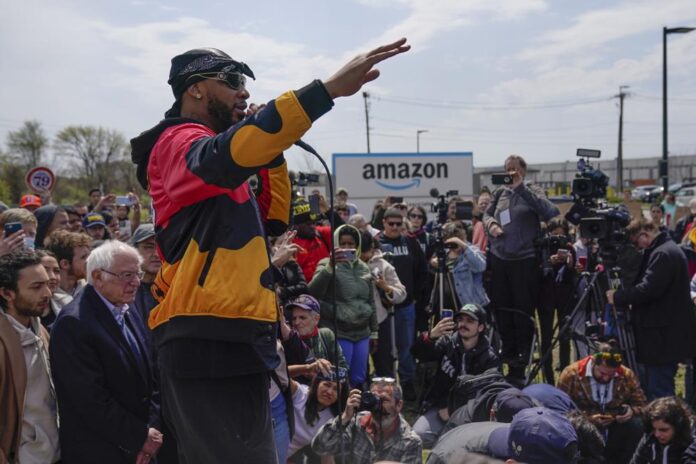
In the grassroots labor movement, Christian Smalls is fast becoming a star in the push for unionization for Amazon and Starbucks workers.
By Cori Zaragoza, Staff Writer
Smalls, 33, led the first successful unionization drive in Amazon’s history, winning unionization for workers in an Amazon warehouse located in Staten Island, NY. His fight for Amazon workers to unionize continues, after it was reported by the Associated Press that a vote in early May rejected a union bid at another Staten Island warehouse in New York City. This comes as a blow to the Amazon Labor Union, who were previously successful in April in organizing the first union in Amazon’s history at a different Staten Island facility.
Smalls, who was fired in 2020 from Amazon after organizing a walk-out in protest of working conditions at the warehouse he worked at, is the leader of the Amazon Labor Union (ALU). He was driven to organize a union after an Amazon memo was leaked that called Smalls, “not smart or articulate,” which was first reported by Vice News in April 2020.
“When I read that memo, that motivated me to start an organization,” said Smalls, in a statement to NPR after winning the first Staten Island Union victory.
TIME Magazine reported that Smalls was raised in Hackensack, New Jersey, by a single mother who worked as an administrator in a hospital, and was also part of union SEIU 1199. He dreamt of becoming a hip-hop artist before his wife became pregnant with twins, after which he began working at various retail jobs, eventually landing at Amazon as a process assistant in 2015.
He says he enjoyed the job, at first, until COVID-19 hit and he felt that Amazon was putting him and other workers at risk with its policies. That was when he decided to stage the walkout in protest, which led to his eventual firing.
After being fired, Smalls started the Amazon union movement through help from his community, eventually starting a GoFundMe where anyone could donate to the ALU, raising over $120,000 dollars. He took those funds and used them to hire lawyers and started organizing a union at the warehouse he was fired from.
According to NPR, Amazon has spent millions of dollars hiring consultants to combat the union campaigns and held mandatory meetings for workers, telling them to vote “NO” against unionizing. Firmly anti-union, Amazon even had Smalls and other organizers arrested for trespassing when they visited the warehouse to bring food to workers.
Despite Amazon’s efforts, the Associated Press reported that the ALU won in April, gaining enough votes to form the first ever Amazon union. In early May, another vote to unionize a separate Staten Island Facility lost, with the Associated Press counting 618 votes against the union versus 380 votes who were for it.
In a May article by the Associated Press, John Logan, director of labor and employment studies at San Francisco State University, spoke on why he wasn’t surprised by the union’s loss.
Logan says that the ALU were “stretched thin,” and lacked the money and resources to come up against the retail giant that is Amazon. Moreover, he says a second win would have rattled Amazon executives and given legitimacy to the ALU. He predicts that the labor activism seen with the ALU will flourish throughout the United States.
“A second defeat could have proved fatal to the company’s efforts to stop the organizing from spreading like wildfire, just as it has done at Starbucks,” Logan said to the Associated Press. “The ALU’s organizing campaign will continue and that labor activism at Amazon will continue to spread across the country.”
Smalls acknowledged on Twitter that a second win was always going to be harder to get, and that workers should not give up against Amazon’s aggressive anti-union tactics.
“Nothing changes we organize!” Smalls tweeted. “Do not be discouraged or sad, be upset and talk to your coworkers.”


